Introduction
The landscape of medical device approval is undergoing a significant transformation with the introduction of Modular PMA (Premarket Approval) submissions. This innovative approach allows manufacturers to break down their applications into manageable components, each addressing specific aspects such as device design and clinical data. Unlike traditional PMA submissions, which require a complete package upfront, Modular PMA submissions facilitate a more streamlined and efficient review process by the FDA.
As stakeholders in the medical device industry navigate this evolving regulatory framework, understanding the advantages of modular submissions—ranging from enhanced communication with regulatory bodies to improved resource management—becomes crucial. This article delves into the intricacies of Modular PMA submissions, highlighting their potential to not only expedite time-to-market but also foster collaboration among diverse stakeholders, ultimately leading to better patient outcomes and innovation in medical technology.
Understanding Modular PMA Submissions: A Comprehensive Overview
The concept of modular PMA (Premarket Approval) proposals signifies a strategic improvement in the application process for medical products with the FDA. This structured approach differs from conventional PMA applications, which necessitate that all required information be provided in a single comprehensive package. Rather, modular PMA filings enable producers to organize their applications into separate modules, each focusing on specific aspects such as product design, manufacturing methods, and clinical information.
This modular PMA not only streamlines the submission method but also allows for incremental information submission, facilitating a more efficient review by the FDA. Our extensive clinical trial management services, directed by Katherine Ruiz, a specialist in compliance matters for medical instruments and in vitro diagnostics in Colombia, assist every stage of this process. This includes:
- Conducting feasibility studies
- Selecting research sites
- Ensuring compliance through thorough reviews of study documents
We also oversee trial setup, which includes:
- Obtaining ethics committee approvals
- Health ministry clearances
- Managing import permits
- Nationalization of investigational equipment
Our project management expertise ensures that the study is meticulously monitored, with regular reporting on study status, inventory, and both serious and non-serious adverse events. It is essential to note that the FDA will issue any order denying approval of a PMA in accordance with §814.17, emphasizing the oversight framework surrounding these submissions.
Furthermore, Class III products that fail to satisfy modular PMA standards are deemed adulterated and cannot be sold, highlighting the significance of adherence within the modular PMA framework. As the landscape of compliance processes evolves, understanding the modular PMA approach becomes essential for stakeholders involved in medical device development. It aligns with the FDA's ongoing commitment to enhancing regulatory efficiency and adapting to the needs of the industry, particularly in light of the recent shift in regulatory priorities among industry leaders, where nearly 90 percent are emphasizing US regulatory approval amid challenges posed by the EU's new MDR, as highlighted in the case study titled 'Industry Leaders' Regulatory Priorities'.
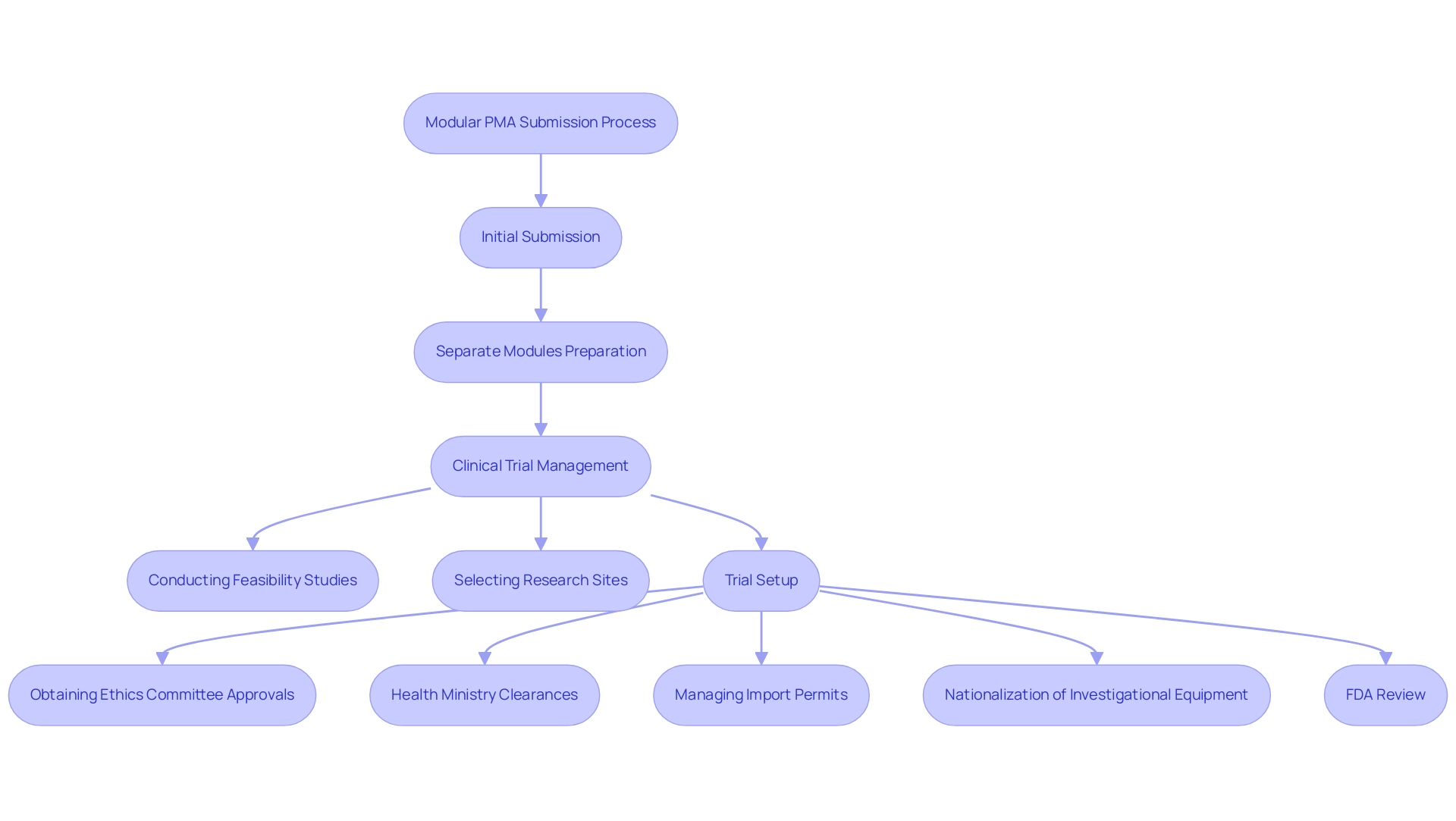
Key Advantages of Modular PMA Submissions: Flexibility and Efficiency
-
Flexibility in Presentation: Modular PMA filings provide manufacturers with the unique advantage of presenting different components of their application as they become ready, rather than waiting for a complete package. This flexibility can significantly expedite time-to-market for medical products, enabling quicker access to innovative treatments for patients. Significantly, prompt entries can assist in tackling the statistic that an additional 18% of equipment had not undergone any post-market trials, highlighting the necessity for effective regulatory procedures.
-
Enhanced Communication with the FDA: Submitting modules incrementally allows for ongoing feedback from the FDA on specific sections of the application. This proactive dialogue not only helps address potential issues early in the review phase but also fosters a collaborative relationship between manufacturers and regulators, facilitating more efficient resolutions. As Katrina Rogers pointed out, "If timely device evaluation review is vital to your business, you should consider writing your Senator to express your support for this program."
-
Streamlined Review Process: The modular approach enhances the efficiency of the review process. FDA reviewers can concentrate on individual modules rather than being overwhelmed with a comprehensive application. This targeted focus can accelerate approvals, ultimately benefiting patients in need of new medical devices.
-
Improved Resource Management: Modular contributions allow for better allocation of resources, as teams can concurrently work on various modules. This parallel processing method results in more efficient project timelines and assists in reducing overall project expenses, making the development phase more economical.
-
Risk Mitigation: Gradual contributions allow manufacturers to recognize and tackle risks linked to the product early in the development process. This innovative approach can improve quality of entries and greatly lessen the chances of delays caused by compliance issues.
-
Facilitation of Iterative Improvements: Continuous feedback on each module empowers manufacturers to make iterative enhancements to their product or application. This flexibility not only enhances the overall standard of the equipment but also streamlines the process, conforming to compliance expectations.
-
Enhanced Stakeholder Trust: By embracing a modular PMA filing approach, manufacturers demonstrate their dedication to compliance with regulations and quality assurance. This proactive stance can bolster confidence among stakeholders—investors, healthcare providers, and patients alike—in the safety and efficacy of the device.
-
Real-World Example of Regulatory Flexibility: The Humanitarian Device Exemption (HDE) demonstrates the regulatory flexibility that can be attained through modular applications. Devices designed to treat conditions impacting fewer than 4,000 individuals each year in the U.S. can gain from simplified approval methods, enabling manufacturers to meet urgent medical needs while ensuring patient safety.
-
Incorporation of Import Permits and Reporting: The entry approach of the modular PMA also includes essential service capabilities such as obtaining import permits and nationalization of investigational devices, along with thorough reporting on study status, covering both serious and non-serious adverse events. This holistic view of the regulatory process is essential for effective clinical trial management and compliance.
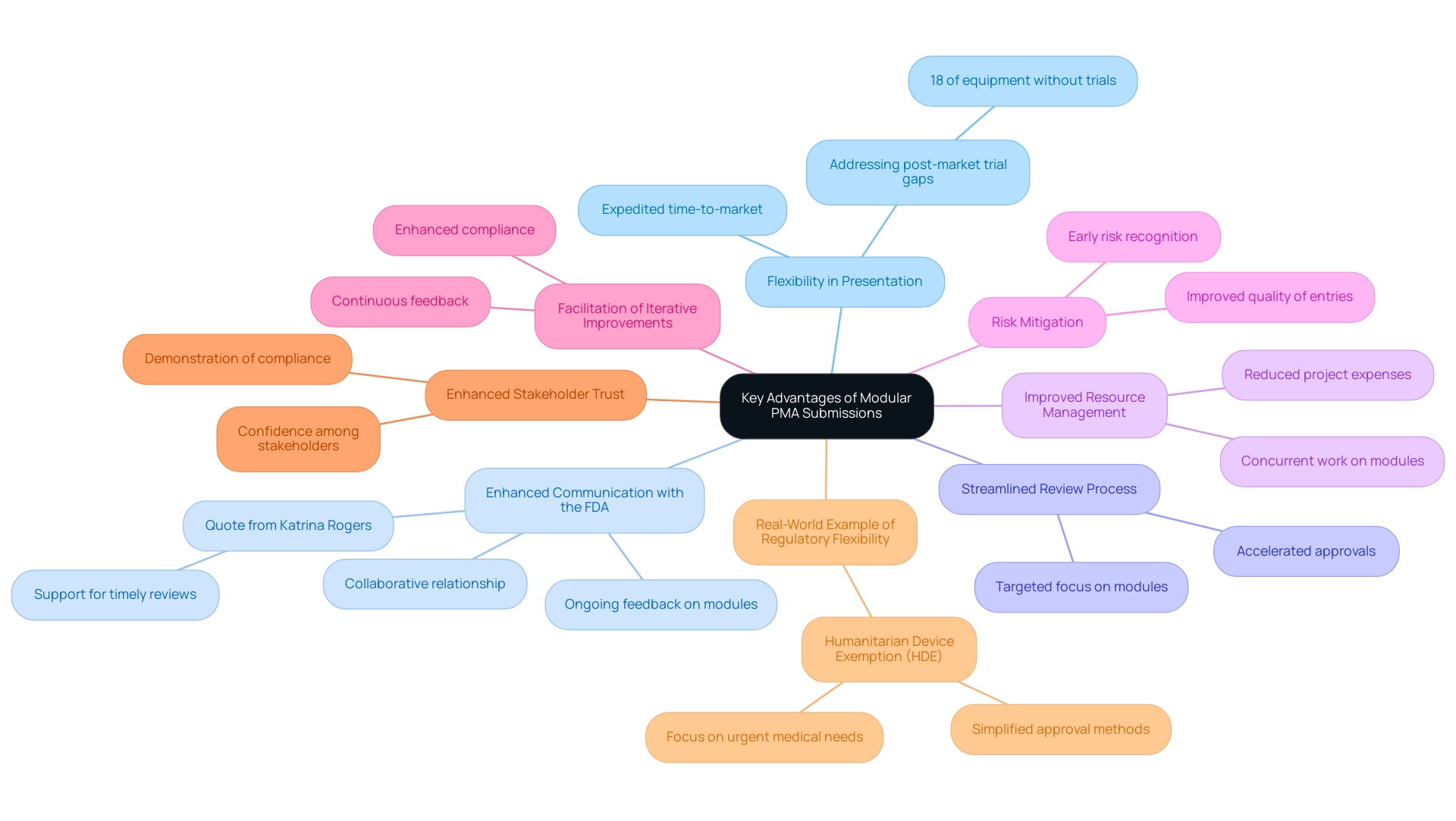
Regulatory Compliance and Risk Management
Regulatory compliance serves as a cornerstone of modular pma filings, requiring strict adherence to FDA guidelines to ensure the accuracy and reliability of all data presented. This modular pma framework allows manufacturers to dissect their entries into manageable sections, fostering a focused approach to effectively meet compliance requirements. Such segmentation not only enhances the quality of the contribution but also streamlines risk management; should a specific module encounter challenges, it can be rectified independently without impeding the overall timeline.
Significantly, the expertise of Ana Criado, our Director of Compliance Affairs, who has extensive experience in oversight roles at INVIMA and as a consultant for global companies, strengthens our commitment to compliance excellence. Ana plays a pivotal role in guiding the PMA approval process, ensuring that all submissions comply with established standards. A relevant example is the VBLOC tool, which resulted in approximately 25 percent excess weight loss among treated patients, highlighting the potential positive patient outcomes linked to robust compliance practices.
Staying informed about the latest compliance updates for medical devices, particularly in 2024, is crucial for manufacturers. By integrating these updates into each modular pma, the potential for non-compliance can be significantly reduced, thereby minimizing the likelihood of rejection. Moreover, our extensive clinical trial management services—including feasibility studies, site selection, compliance reviews, trial setup, import permits, project management, and reporting—highlight our commitment to achieving success in compliance.
The Commercialization Agreement with Genzyme emphasizes the significance of collaboration in enhancing compliance, leveraging Genzyme's expertise in hyaluronic acid technology for dermal fillers, ultimately improving competitiveness in the facial aesthetics sector. Notably, Margaret Hamburg, former FDA Commissioner, emphasized the necessity for collaboration among stakeholders in the development process, stating,
To truly leverage advances in science and technology, there must be a collaboration of all relevant stakeholders, including government, academia, and industry.
This cooperative attitude is essential in managing the intricacies of compliance, ensuring that all entries are not only strong but also conform to modern standards.
Furthermore, the financial consequences of successful entries are substantial; for example, the diluted earnings per share for ongoing operations rose from 1.01 in 2006 to 1.24 in 2007, demonstrating how adherence affects overall business success in the medical equipment sector.
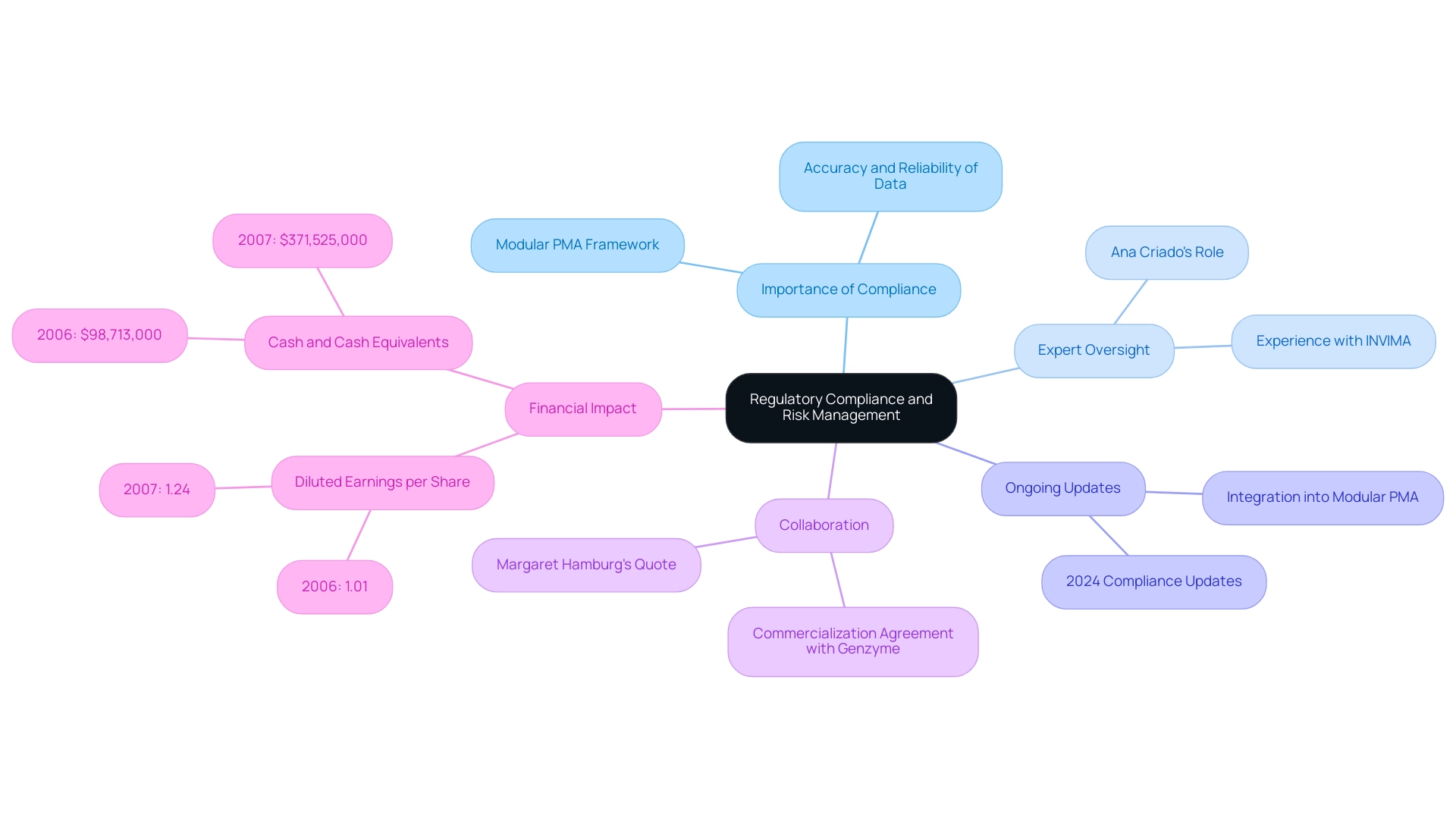
Fostering Collaboration Among Stakeholders
The application procedure for the modular PMA is intended to promote cooperation among a diverse range of participants, such as researchers, oversight agencies, and manufacturing teams. This joint framework is vital for progressing medical equipment trials, as it includes important stages such as:
- Feasibility evaluations
- Investigator selection
- Trial setup
- Approval methods
- Compliance with regulations
The procedure enables gradual contributions, allowing stakeholders to participate in ongoing conversations about specific modules, which not only assists in overcoming compliance obstacles but also tackles challenges encountered by medical device startups, such as competition and hiring difficulties.
Efficient interaction among stakeholders from the beginning can produce invaluable insights and feedback, greatly improving the quality of the final deliverable and boosting success rates in approvals. Moreover, the dynamic nature of modular PMA submissions promotes open lines of communication, enhancing relationships among all parties involved and ensuring a more cohesive and efficient approval journey. The significance of continuous collaboration is highlighted by the necessity for manufacturing facilities to be inspected every two years, which aids in upholding compliance with regulatory standards.
Furthermore, the role of the advisory board is essential in providing expert guidance and support throughout this undertaking. A relevant case study titled 'Search Strategy for Literature Review' illustrates the effectiveness of participatory approaches in medical product development, highlighting stakeholder involvement as a key factor in achieving successful outcomes. To learn more about how we can assist you in this process, BOOK A MEETING with our team.
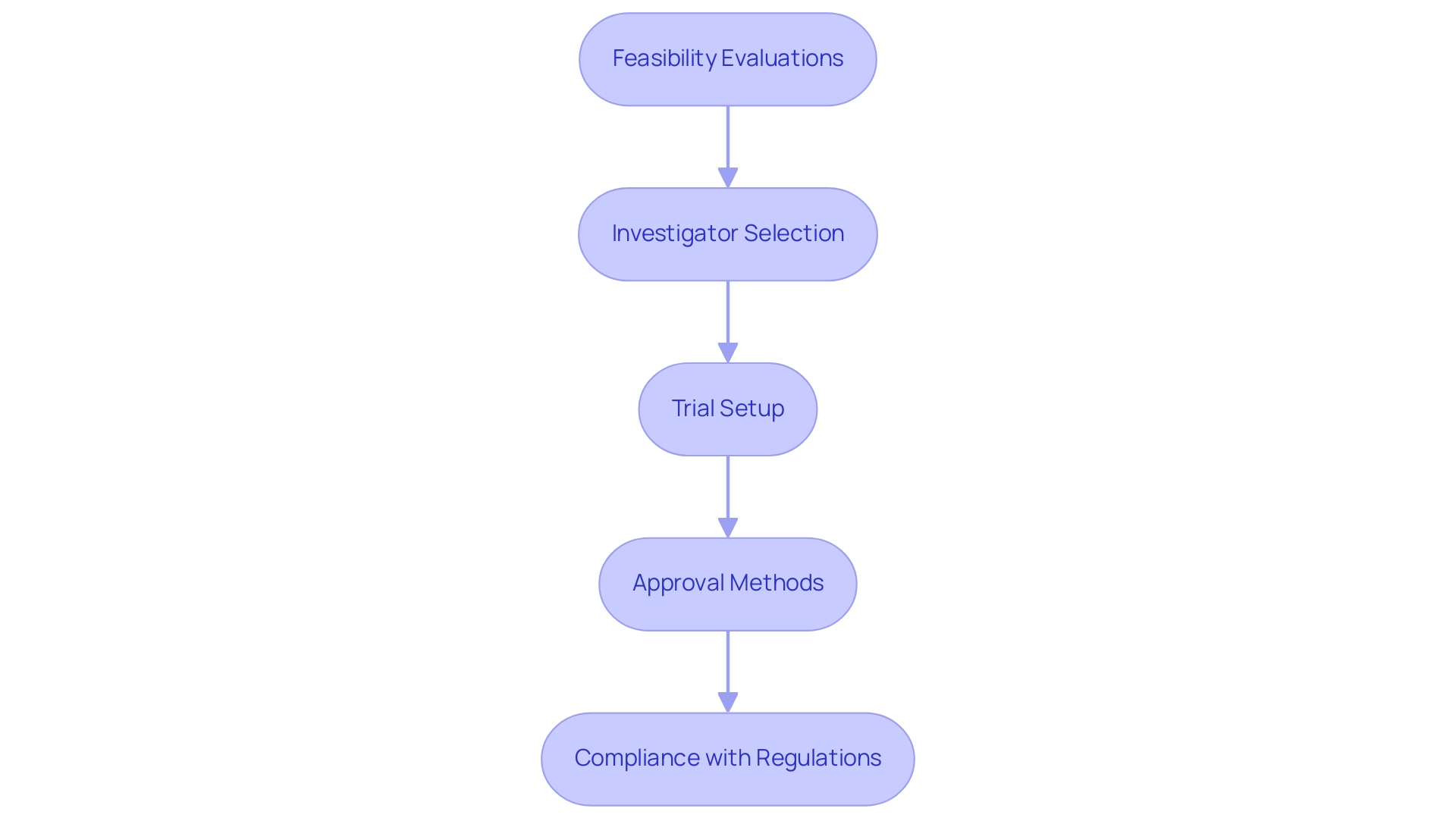
Cost-Effectiveness of Modular PMA Submissions
Adopting modular pma filings provides significant cost benefits for medical product manufacturers, particularly in relation to the four categories of PMAs, each with distinct applications and advantages. This approach facilitates staggered submissions, allowing companies to allocate resources more effectively by concentrating their efforts on individual modules sequentially. For instance, Class III medical instruments, such as implantable cardiac pacemakers and artificial heart valves, can significantly benefit from this method.
By obtaining early feedback from the FDA on specific modules, manufacturers can avert costly rework or delays related to unforeseen compliance issues. This is where comprehensive clinical trial management services come into play, encompassing:
- Feasibility studies
- Site selection
- Compliance reviews
- Trial setup
- Import permits
- Project management
- Reporting
Additionally, INVIMA plays a crucial role in Colombia, overseeing the legislative landscape for medical devices and ensuring compliance with national standards.
The reporting of study status, inventory, and adverse events is essential in clinical trials, providing transparency and accountability throughout. Additionally, the efficient application method can significantly reduce the time needed for compliance assessment, aiding in faster market access and an enhanced return on investment. The Humanitarian Device Exemption (HDE) serves as a pertinent example of regulatory flexibility, illustrating how exemptions can facilitate access to medical devices for rare conditions affecting fewer than 8,000 people annually in the U.S.
The cost-efficiency intrinsic to modular pma proposals makes them a progressively appealing approach for manufacturers aiming to improve their development methods while maximizing financial results.
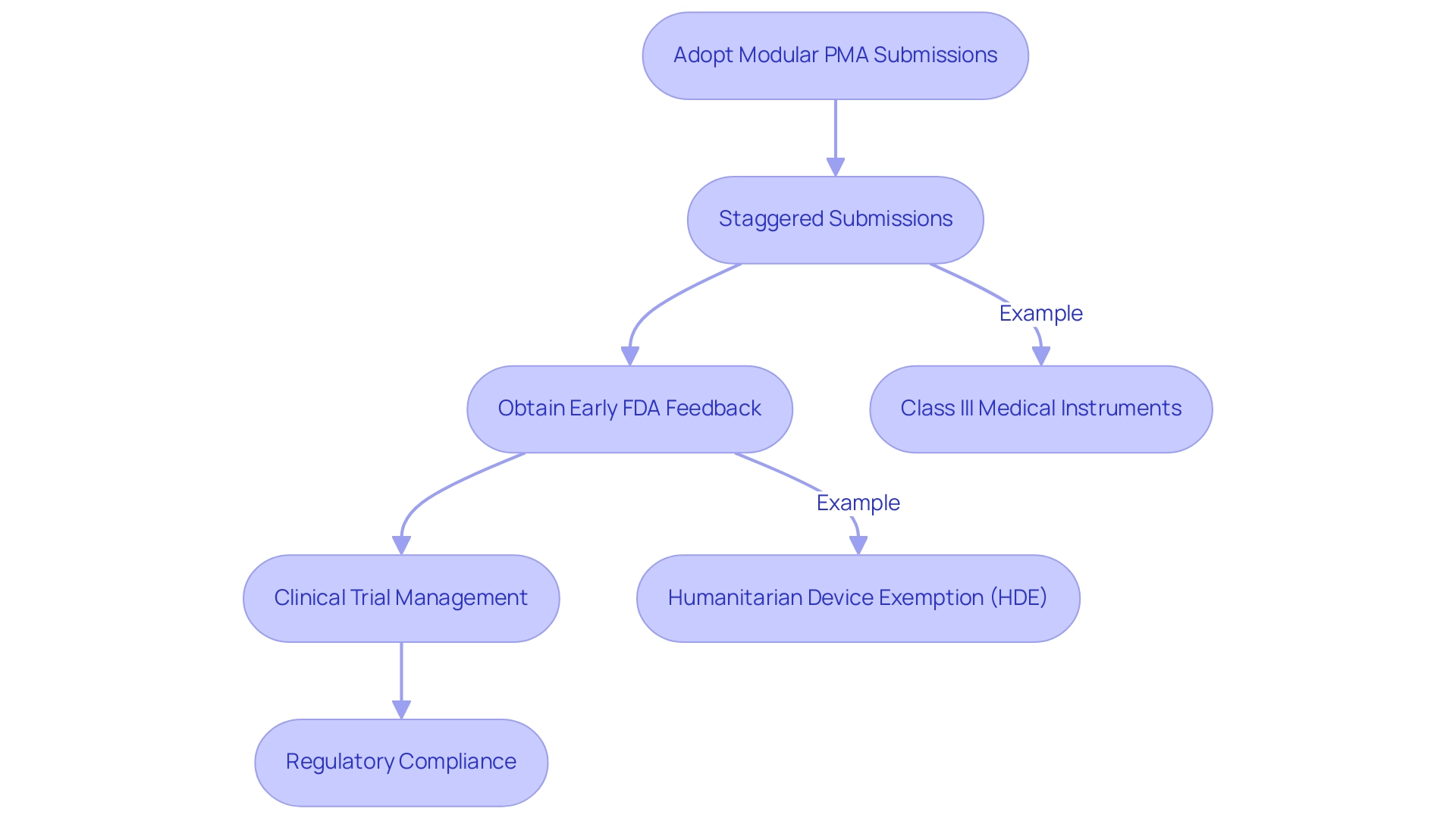
Enhancing Quality Through Incremental Feedback
One of the key benefits of modular pma filings is that they provide manufacturers the opportunity to engage in a systematic feedback loop with the FDA. This iterative process allows for real-time adjustments and enhancements to each entry, significantly improving the quality of the application. As each module is submitted, the FDA conducts a thorough review and offers valuable insights, completing an administrative acceptance review within 15 days of receiving a module.
This efficiency enables manufacturers to promptly address any identified issues before progressing to subsequent modules. Rathi V.K. emphasized the significance of these feedback mechanisms in clinical studies, pointing out their essential role in the lifecycle of high-risk therapeutic medical instruments:
'Characteristics of clinical studies conducted over the total product life cycle of high-risk therapeutic medical instruments receiving FDA premarket approval in 2010 and 2011.'
By fostering a culture of quality and continuous improvement, manufacturers can elevate their submissions to align with the highest standards of safety and efficacy. Embracing this feedback-driven approach not only increases the likelihood of timely approvals but also ensures that high-quality medical products reach the market efficiently. Furthermore, the historical context of the FDA's oversight, which expanded in 1976 to include medical devices, underscores the evolution of the PMA framework and its significance.
Statistics indicate that efficient FDA responses can greatly improve the results of modular pma applications, which is a crucial tactic for manufacturers aiming to optimize their compliance procedures in 2024. In this context, bioaccess® provides extensive clinical trial management services designed to navigate the complexities of these applications, including:
- Early-Feasibility Studies
- First-In-Human Studies
- Pilot Studies
- Pivotal Studies
- Post-Market Clinical Follow-Up Studies
By leveraging our expertise, manufacturers can effectively utilize the feedback from the FDA to improve their PMA proposals, ensuring alignment with compliance expectations, all supported by a team with over 20 years of Medtech expertise.
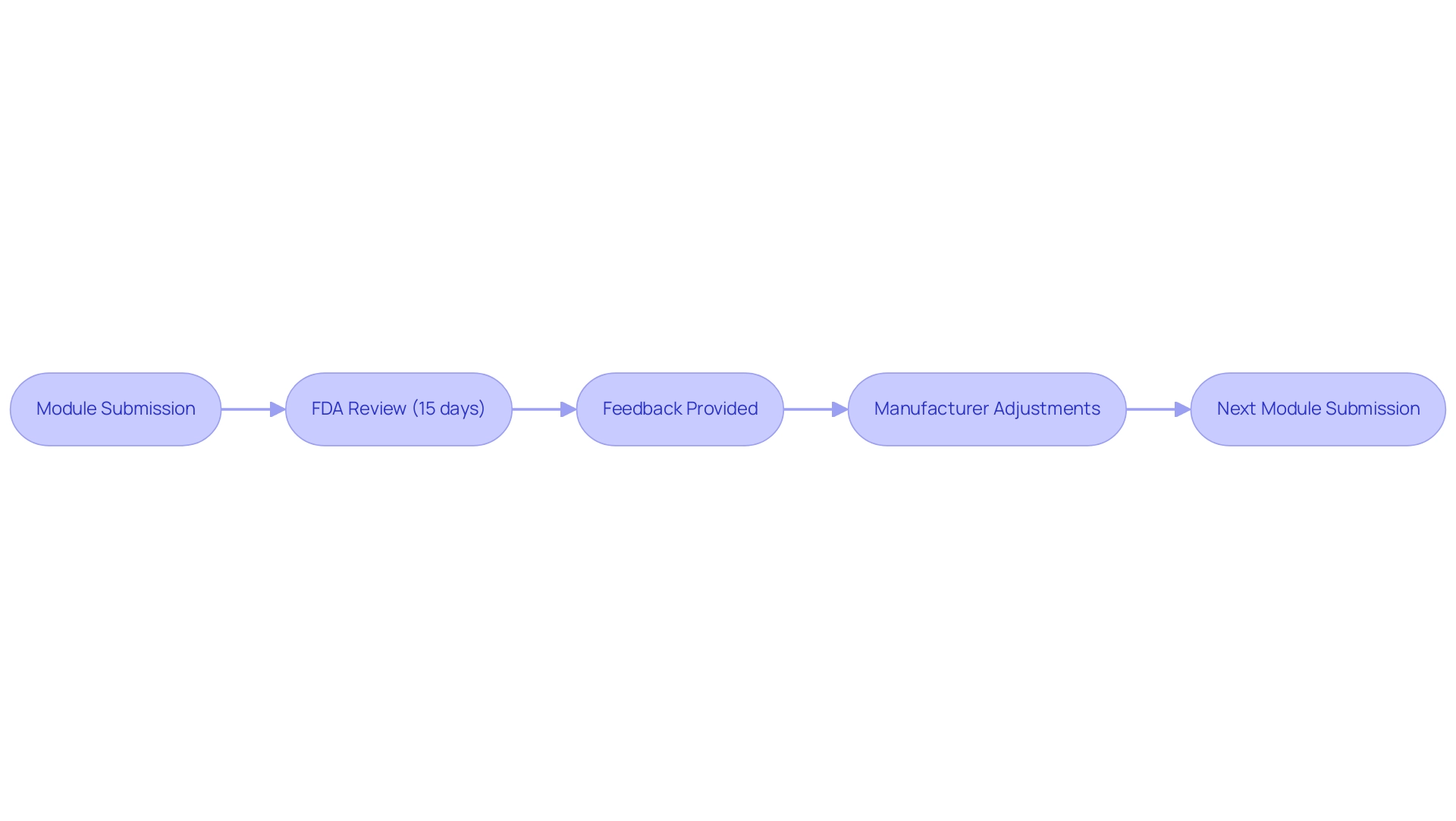
Conclusion: The Future of Modular PMA Submissions
The medical device sector is on the verge of change, with the modular pma applications poised to play a crucial role in regulatory activities. These contributions provide manufacturers a flexible and efficient route to navigate the complexities of FDA approvals, focusing on quality and compliance. Our comprehensive clinical trial management services encompass:
- Feasibility studies
- Site selection
- Compliance reviews
- Trial setup—including obtaining necessary ethics committee approvals
- Import permits
- Project management
- Detailed reporting on study status, inventory, and both serious and non-serious adverse events
This ensures that every aspect of the clinical trial process is meticulously handled. As industry stakeholders increasingly acknowledge the advantages of this innovative method, a wider acceptance of modular pma proposals is expected, especially considering the changing environment of AI in MedTech, which emphasizes compliance with regulations and operational effectiveness. Analysts view the reduction in wait times for approvals as a positive trend, further supporting the case for modular pma submissions.
This shift is expected to foster enhanced collaboration among manufacturers, regulators, and clinical researchers, ultimately leading to improved compliance and better patient outcomes. Furthermore, with Katherine Ruiz's knowledge in compliance matters for medical products and in vitro diagnostics in Colombia, we are well-prepared to navigate the intricacies of legal requirements efficiently. The recent incident involving Artivion, which faced interruptions in its shipping methods due to a ransomware attack, emphasizes the vital significance of operational efficiency and security in the context of compliance with regulations.
With the changing environment of medical tools, the ongoing enhancement of modular pma methods will be essential for maintaining alignment with progress in technology and compliance requirements. As Páll Jóhannesson aptly notes,
Whether you’ve got a new clinical trial on the horizon, or you’re just fed up with the limitations of the way you’re currently capturing clinical data, you’ve probably got a...
This sentiment underscores the urgency for industry players to adapt to these evolving regulatory processes, which are essential for future success in medical device development.
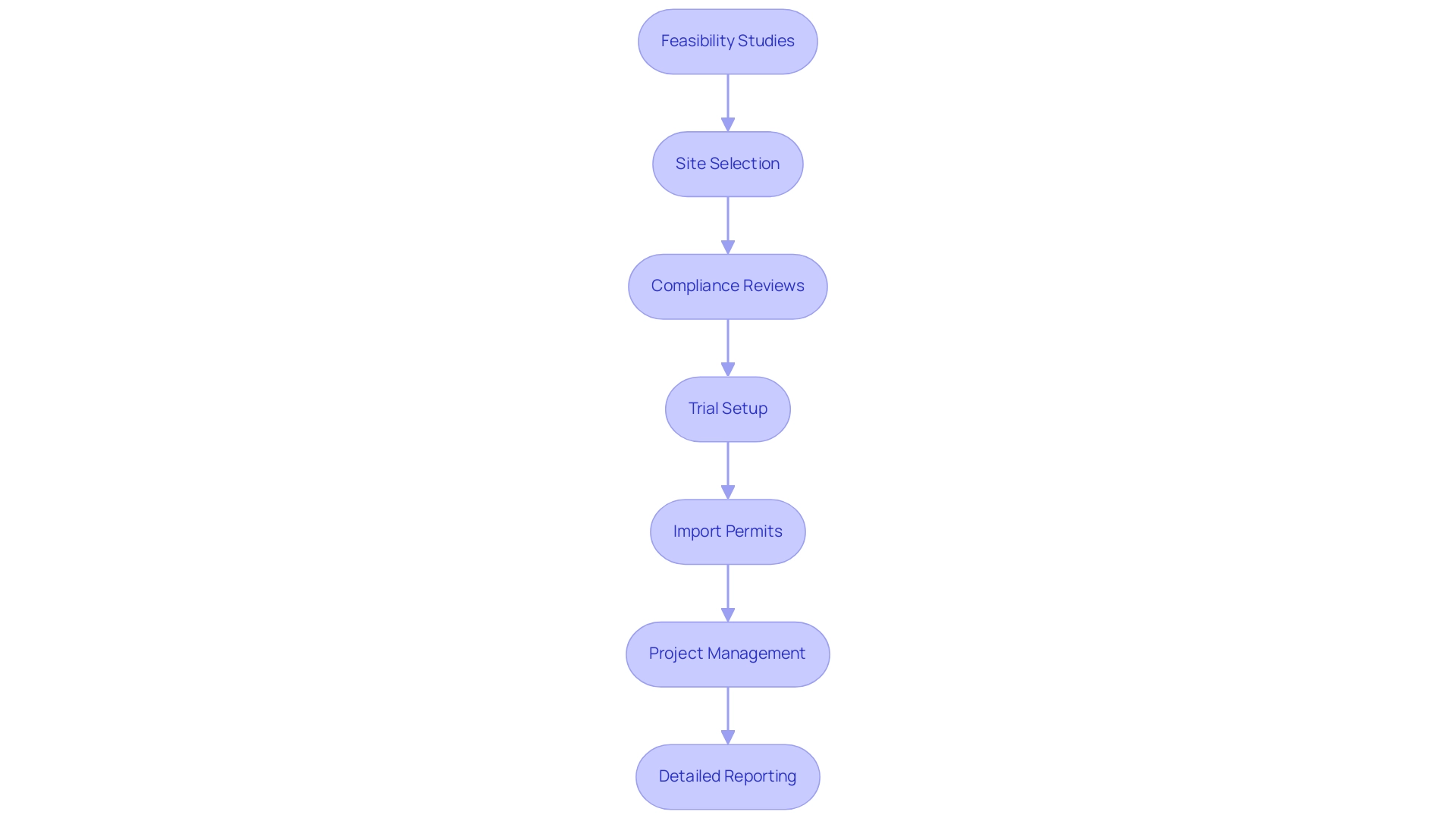
Conclusion
The Modular PMA submission process represents a transformative shift in the regulatory landscape for medical devices, offering a structured yet flexible approach that enables manufacturers to navigate the complexities of FDA approvals with greater efficiency. By compartmentalizing applications into manageable modules, stakeholders can benefit from enhanced communication with regulatory bodies, streamlined review processes, and improved resource management. This innovative framework not only accelerates time-to-market but also fosters collaboration among diverse teams, ultimately leading to better patient outcomes.
The advantages of Modular PMA submissions extend beyond mere compliance; they encapsulate a proactive strategy for risk mitigation and iterative improvements. By allowing for continuous feedback from the FDA, manufacturers can refine their submissions in real-time, ensuring that each module aligns with regulatory expectations. This iterative process enhances the overall quality of medical devices, reinforcing the commitment to safety and efficacy.
As the medical device industry embraces this progressive approach, the anticipated benefits are becoming increasingly clear. The incorporation of Modular PMA submissions is expected to drive operational efficiency, reduce approval wait times, and cultivate a culture of collaboration among manufacturers, regulators, and clinical researchers. In this evolving landscape, organizations equipped with robust clinical trial management services and regulatory expertise will be well-positioned to thrive, adapting to the demands of modern healthcare and advancing innovation in medical technology.
Frequently Asked Questions
What is a modular PMA proposal?
A modular PMA (Premarket Approval) proposal is a structured approach for submitting medical product applications to the FDA, allowing manufacturers to organize their submissions into separate modules focusing on specific aspects like product design, manufacturing methods, and clinical information.
How does the modular PMA process differ from conventional PMA applications?
Unlike conventional PMA applications that require all information in a single comprehensive package, modular PMA filings enable incremental submission of information, which streamlines the application process and facilitates a more efficient review.
What are the benefits of using modular PMA filings?
Benefits include flexibility in presentation, enhanced communication with the FDA, a streamlined review process, improved resource management, risk mitigation, facilitation of iterative improvements, and enhanced stakeholder trust.
How does modular PMA improve communication with the FDA?
Submitting modules incrementally allows for ongoing feedback from the FDA, helping to address potential issues early and fostering a collaborative relationship between manufacturers and regulators.
What impact does modular PMA have on the review process?
The modular approach enhances the efficiency of the review process, allowing FDA reviewers to focus on individual modules, which can accelerate approvals and benefit patients in need of new medical devices.
How does modular PMA contribute to resource management?
Modular contributions allow teams to work on various modules simultaneously, resulting in more efficient project timelines and reduced overall project expenses.
What role does risk mitigation play in modular PMA?
Gradual contributions enable manufacturers to identify and address risks early in the development process, improving the quality of submissions and reducing delays due to compliance issues.
Can manufacturers make improvements during the modular PMA process?
Yes, continuous feedback on each module allows manufacturers to make iterative enhancements to their product or application, improving quality and compliance.
How does the modular PMA approach enhance stakeholder trust?
By demonstrating dedication to compliance and quality assurance through modular filings, manufacturers can bolster confidence among stakeholders, including investors, healthcare providers, and patients.
What is an example of regulatory flexibility related to modular PMA?
The Humanitarian Device Exemption (HDE) is an example, allowing devices for rare conditions to gain simplified approval methods, addressing urgent medical needs while ensuring patient safety.
What additional services are included in the modular PMA process?
The modular PMA process includes obtaining import permits, nationalization of investigational devices, and thorough reporting on study status, including serious and non-serious adverse events.




